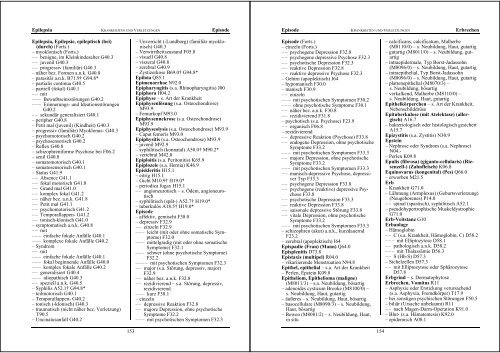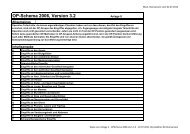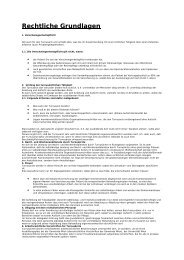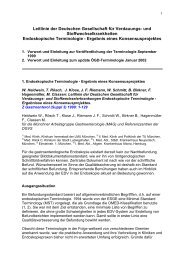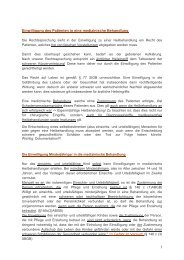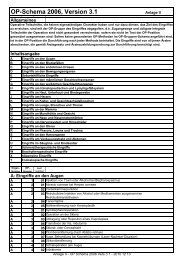ICD10 - Alphabetisch - Grafino.at
ICD10 - Alphabetisch - Grafino.at
ICD10 - Alphabetisch - Grafino.at
Erfolgreiche ePaper selbst erstellen
Machen Sie aus Ihren PDF Publikationen ein blätterbares Flipbook mit unserer einzigartigen Google optimierten e-Paper Software.
Epilepsia KRANKHEITEN UND VERLETZUNGEN Episode<br />
Epilepsia, Epilepsie, epileptisch (bei)<br />
(durch) (Forts.)<br />
– myoklonisch (Forts.)<br />
–– benigne, im Kleinkindesalter G40.3<br />
–– juvenil G40.3<br />
–– progressiv (familiär) G40.3<br />
– näher bez. Formen a.n.k. G40.8<br />
– parasitär a.n.k. B71.9† G94.8*<br />
– partialis continua G40.5<br />
– partiell (fokal) G40.1<br />
–– mit<br />
––– Bewußtseinsstörungen G40.2<br />
––– Erinnerungs- und Ide<strong>at</strong>ionsstörungen<br />
G40.2<br />
–– sekundär generalisiert G40.1<br />
– peripher G40.8<br />
– Petit mal (juvenil) (Kindheit) G40.3<br />
– progressiv (familiär) Myoklonus- G40.3<br />
– psychomotorisch G40.2<br />
– psychosensorisch G40.2<br />
– Reflex G40.8<br />
– schizophreniforme Psychose bei F06.2<br />
– senil G40.8<br />
– som<strong>at</strong>omotorisch G40.1<br />
– som<strong>at</strong>osensorisch G40.1<br />
– St<strong>at</strong>us G41.9<br />
– – Absence G41.1<br />
– – fokal motorisch G41.8<br />
–– Grand mal G41.0<br />
– – komplex fokal G41.2<br />
– – näher bez. a.n.k. G41.8<br />
–– Petit mal G41.1<br />
– – psychomotorisch G41.2<br />
–– Temporallappen- G41.2<br />
– – tonisch-klonisch G41.0<br />
– symptom<strong>at</strong>isch a.n.k. G40.8<br />
–– mit<br />
––– einfache fokale Anfälle G40.1<br />
––– komplexe fokale Anfälle G40.2<br />
– Syndrom<br />
–– mit<br />
––– einfache fokale Anfälle G40.1<br />
––– fokal beginnende Anfälle G40.0<br />
––– komplex fokale Anfälle G40.2<br />
–– generalisiert G40.4<br />
––– idiop<strong>at</strong>hisch G40.3<br />
– – speziell a.n.k. G40.5<br />
– Syphilis A52.1† G94.8*<br />
– teilmotorisch G40.1<br />
– Temporallappen- G40.2<br />
– tonisch (-klonisch) G40.3<br />
– traum<strong>at</strong>isch (nicht näher bez. Verletzung)<br />
T90.5<br />
– Uncin<strong>at</strong>usanfall G40.2<br />
153<br />
– Unverricht (-Lundborg) (familiär myoklonisch)<br />
G40.3<br />
– Verwirrtheitszustand F05.8<br />
– visuell G40.8<br />
– viszeral G40.8<br />
– zerebral G40.9<br />
– Zystizerkose B69.0† G94.8*<br />
Epiloia Q85.1<br />
Epimenorrhoe N92.0<br />
Epipharyngitis (s.a. Rhinopharyngitis) J00<br />
Epiphora H04.2<br />
Epiphyse – s. Art der Krankheit<br />
Epiphysenlösung (s.a. Osteochondrose)<br />
M93.9<br />
– Femurkopf M93.0<br />
Epiphysennekrose (s.a. Osteochondrose)<br />
M93.9<br />
Epiphyseolysis (s.a. Osteochondrose) M93.9<br />
– Caput femoris M93.0<br />
Epiphysitis (s.a. Osteochondrose) M93.9<br />
– juvenil M92.9<br />
– syphilitisch (konn<strong>at</strong>al) A50.0† M90.2*<br />
– vertebral M42.0<br />
Epiploitis (s.a. Peritonitis) K65.9<br />
Epiplozele (s.a. Hernia) K46.9<br />
Episkleritis H15.1<br />
– eitrig H15.1<br />
– Gicht M10.9† H19.0*<br />
– periodica fugax H15.1<br />
– – angioneurotisch – s. Ödem, angioneurotisch<br />
– syphilitisch (spät-) A52.7† H19.0*<br />
– tuberkulös A18.5† H19.0*<br />
Episode<br />
– affektiv, gemischt F38.0<br />
– depressiv F32.9<br />
– – einzeln F32.9<br />
––– leicht (mit oder ohne som<strong>at</strong>ische Symptome)<br />
F32.0<br />
––– mittelgradig (mit oder ohne som<strong>at</strong>ische<br />
Symptome) F32.1<br />
––– schwer (ohne psychotische Symptome)<br />
F32.2<br />
–––– mit psychotischen Symptomen F32.3<br />
–– major (s.a. Störung, depressiv, major)<br />
F32.9<br />
–– näher bez. a.n.k. F32.8<br />
– – rezidivierend – s.a. Störung, depressiv,<br />
rezidivierend<br />
––– kurz F38.1<br />
– einzeln<br />
– – depressive Reaktion F32.8<br />
– – majore Depression, ohne psychotische<br />
Symptome F32.2<br />
––– mit psychotischen Symptomen F32.3<br />
Episode KRANKHEITEN UND VERLETZUNGEN Erbrechen<br />
Episode (Forts.)<br />
– einzeln (Forts.)<br />
– – psychogene Depression F32.8<br />
– – psychogene depressive Psychose F32.3<br />
– – psychotische Depression F32.3<br />
– – reaktive Depression F32.8<br />
– – reaktive depressive Psychose F32.3<br />
– Gehirn (apoplektisch) I64<br />
– hypomanisch F30.0<br />
– manisch F30.9<br />
– – einzeln<br />
––– mit psychotischen Symptomen F30.2<br />
––– ohne psychotische Symptome F30.1<br />
–– näher bez. a.n.k. F30.8<br />
–– rezidivierend F31.8<br />
– psychotisch (s.a. Psychose) F23.9<br />
– – organisch F06.8<br />
– rezidivierend<br />
– – depressive Reaktion (Psychose) F33.8<br />
– – endogene Depression, ohne psychotische<br />
Symptome F33.2<br />
––– mit psychotischen Symptomen F33.3<br />
– – majore Depression, ohne psychotische<br />
Symptome F33.2<br />
––– mit psychotischen Symptomen F33.3<br />
– – manisch-depressive Psychose, depressiver<br />
Typ F33.3<br />
– – psychogene Depression F33.8<br />
– – psychogene (reaktive) depressive Psychose<br />
F33.8<br />
– – psychotische Depression F33.3<br />
– – reaktive Depression F33.8<br />
– – saisonale depressive Störung F33.8<br />
– – vitale Depression, ohne psychotische<br />
Symptome F33.2<br />
––– mit psychotischen Symptomen F33.3<br />
– schizophren (akut) a.n.k., kurzdauernd<br />
F23.2<br />
– zerebral (apoplektisch) I64<br />
Epispadie (Frau) (Mann) Q64.0<br />
Episplenitis D73.8<br />
Epistaxis (multipel) R04.0<br />
– vikariierende Menstru<strong>at</strong>ion N94.8<br />
Epithel, epithelial – s.a. Art der Krankheit<br />
– Perlen, Epstein K09.8<br />
Epitheliom, Epithelioma (maligne)<br />
(M8011/3) – s.a. Neubildung, bösartig<br />
– adenoides cysticum Brooke (M8100/0) –<br />
s. Neubildung, Haut, gutartig<br />
– äußeres – s. Neubildung, Haut, bösartig<br />
– basocellulare (M8090/3) – s. Neubildung,<br />
Haut, bösartig<br />
– Bowen (M8081/2) – s. Neubildung, Haut,<br />
in situ<br />
154<br />
– calcificans, calcific<strong>at</strong>um, Malherbe<br />
(M8110/0) – s. Neubildung, Haut, gutartig<br />
– gutartig (M8011/0) – s. Neubildung, gutartig<br />
– intraepidermale, Typ Borst-Jadassohn<br />
(M8096/0) – s. Neubildung, Haut, gutartig<br />
– intraepithelial, Typ Borst-Jadassohn<br />
(M8096/0) – s. Neubildung, Haut, gutartig<br />
– pl<strong>at</strong>tenepithelial (M8070/3) –<br />
s. Neubildung, bösartig<br />
– verkalkend, Malherbe (M8110/0) –<br />
s. Neubildung, Haut, gutartig<br />
Epithelkörperchen – s. Art der Krankheit,<br />
Nebenschilddrüse<br />
Epituberkulose (mit Atelektase) (allergisch)<br />
A16.7<br />
– bakteriologisch oder histologisch gesichert<br />
A15.7<br />
Epizystitis (s.a. Zystitis) N30.9<br />
Epstein<br />
– Nephrose oder Syndrom (s.a. Nephrose)<br />
N04.-<br />
– Perlen K09.8<br />
Epulis (fibrosa) (giganto-cellularis) (Riesenzell-)<br />
(Zahnfleisch) K06.8<br />
Equinovarus (kongenital) (Pes) Q66.0<br />
– erworben M21.5<br />
Erb<br />
– Krankheit G71.0<br />
– Lähmung (Armplexus) (Geburtsverletzung)<br />
(Neugeborenes) P14.0<br />
– – spinal (spastisch), syphilitisch A52.1<br />
– pseudohypertrophische Muskeldystrophie<br />
G71.0<br />
Erb-Veitstanz G10<br />
Erbanlage<br />
– Hämoglobin<br />
– – C (s.a. Krankheit, Hämoglobin, C) D58.2<br />
––– mit Elliptozytose D58.1<br />
– – p<strong>at</strong>hologisch a.n.k. D58.2<br />
––– mit Thalassämie D56.3<br />
–– S (Hb-S) D57.3<br />
– Sichelzellen D57.3<br />
–– mit Elliptozytose oder Sphärozytose<br />
D57.8<br />
Erbgrind – s. Derm<strong>at</strong>ophytose<br />
Erbrechen, Vomitus R11<br />
– Asphyxie oder Erstickung verursachend<br />
(s.a. Asphyxia, Fremdkörper) T17.9<br />
– bei sonstigen psychischen Störungen F50.5<br />
– biliär (Ursache unbekannt) R11<br />
–– nach Magen-Darm-Oper<strong>at</strong>ion K91.0<br />
– Blut- (s.a. Häm<strong>at</strong>emesis) K92.0<br />
– epidemisch A08.1


